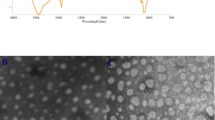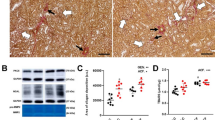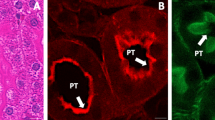Abstract
Recent studies have suggested that heat shock proteins (HSPs) are involved in the restoration of the cytoskeletal anchorage of Na,K-ATPase after renal ischemia. To determine their role in ischemic conditioning, we investigated whether cytoskeletal Na,K-ATPase was stabilized during repeat ischemia concurrent with 25-kD and 70-kD HSPs induction. Anesthetized rats either underwent single unilateral renal ischemia or were conditioned with bilateral renal ischemia and, after 18 h of reflow, were then subjected to repeat unilateral renal ischemia. Renal cortex was harvested, and effects of single versus repeat ischemia were compared by Triton X-100 extraction, by immunohistochemistry, and by an in vitro assay of Na,K-ATPase association with isolated cytoskeletal fractions. In contrast to single ischemia, repeat ischemia did not result in increased Triton X-100 extractability of Na,K-ATPase. Levels of 25-kD and 70-kD HSPs were significantly induced by ischemic conditioning and redistributed into the cytoskeletal fraction after single and repeat ischemia. Immunohistochemistry also showed significant disruption of Na,K-ATPase within proximal tubules only after a single episode of ischemia, whereas repeat ischemia did not alter the pattern of restored Na,K-ATPase localization in conditioned renal cortex. The preserved association of Na,K-ATPase with the cytoskeletal fraction of conditioned renal cortex was effectively abolished in vitro by addition of antibodies against 25-kD or 70-kD HSP. These results suggest that 25-kD and 70-kD HSPs induced by ischemic conditioning stabilize the cytoskeletal anchorage of Na,K-ATPase during repeat renal ischemia.
Similar content being viewed by others
Log in or create a free account to read this content
Gain free access to this article, as well as selected content from this journal and more on nature.com
or
Abbreviations
- HSP:
-
heat-shock protein
- ECL:
-
enhanced chemiluminescence
References
Siegel NJ, Devarajan P, Van Why SK 1994 Renal cell injury: metabolic structural alterations. Invited review. Pediatr Res 36: 129–136
Molitoris BA 1991 New insights into the cell biology of ischemic acute renal failure. J Am Soc Nephrol 1: 1263–1270
Molitoris BA, Dahl R, Geerdes A 1992 Cytoskeletal disruption apical redistribution of proximal tubule Na,K-ATPase during ischemia. Am J Physiol 263: F488–F495
Aufricht C, Lu E, Thulin G, Kashgarian M, Siegel NJ, Van Why SK 1998 ATP releases HSP-72 from protein aggregates after renal ischemia. Am J Physiol 274: F268–F274
Bidmon B, Endemann M, Mueller T, Arbeiter K, Herkner K, Aufricht C 2000 HSP-70 repairs tubule cell structure after renal ischemia. Kidney Int 58: 2400–2407
Aufricht C, Ardito T, Thulin G, Kashgarian M, Siegel NJ, Van Why SK 1998 Heat-shock protein 25 induction redistribution during actin reorganization after renal ischemia. Am J Physiol 274: F215–F222
Schober A, Mueller E, Thurau K, Beck FX 1997 The response of heat shock proteins 25 72 to ischaemia in different kidney zones. Pflugers Arch 434: 292–299
Van Why SK, Hildebrand F, Ardito T, Mann AS, Siegel NJ, Kashgarian M 1992 Induction intracellular localization of HSP-72 after renal ischemia. Am J Physiol 263: F769–F775
Huot J, Houle F, Spitz DR, Landry J 1996 HSP27 phosphorylation-mediated resistance against actin fragmentation cell death induced by oxidative stress. Cancer Res 56: 273–279
Van Why SK, Mann AS, Ardito T, Siegel NJ, Kashgarian M 1994 Expression molecular regulation of Na+-K+-ATPase after renal ischemia. Am J Physiol 267: F75–F85
Minowada G, Welch WJ 1995 Clinical implications of the stress response. J Clin Invest 95: 3–12
Morimoto RI, Tissieres A, Georgopoulos C 1994 The Biology of Heat Shock Proteins and Molecular Chaperones. Cold Spring Harbor Laboratory Press, New York
Van Why SK, Siegel NJ 2001 Heat shock proteins: role in prevention and recovery from acute renal failure. In: Molitoris B, Finn W (eds) Acute Renal Failure: A Companion to Brenner & Rector's The Kidney. WB Saunders, Philadelphia, pp 143–156
Zager RA, Baltes LA 1984 Responses of the ischemic acute renal failure kidney to additional ischemic events. Kidney Int 26: 689–700
Joannidis M, Cantley LG, Spokes K, Medina R, Pullman J, Rosen S, Epstein FH 1995 Induction of heat-shock proteins does not prevent renal tubular injury following ischemia. Kidney Int 47: 1752–1759
Zager RA, Iwata M, Burkhart KM, Schimpf BA 1994 Post ischemic acute renal failure protects proximal tubules from O2 deprivation, possibly by inducing uremia. Kidney Int 45: 1760–1768
Borkan SC, Wang YH, Lieberthal W, Burke PR, Schwartz JH 1997 Heat stress ameliorates ATP depletion-induced sublethal injury in mouse proximal tubule cells. Am J Physiol 272: F347–F355
Turman MA, Rosenfeld SL 1999 Heat shock protein 70 overexpression protects LLC-PK1 tubular cells from heat shock but not hypoxia. Kidney Int 55: 189–97
Author information
Authors and Affiliations
Corresponding author
Additional information
Supported by P12512-MED from the Austrian Science Foundation and by National Institute of Diabetes and Digestive Kidney Diseases grant DK 44336-06.
Rights and permissions
About this article
Cite this article
Aufricht, C., Bidmon, B., Ruffingshofer, D. et al. Ischemic Conditioning Prevents Na,K-ATPase Dissociation from the Cytoskeletal Cellular Fraction after Repeat Renal Ischemia in Rats. Pediatr Res 51, 722–727 (2002). https://doi.org/10.1203/00006450-200206000-00010
Received:
Accepted:
Issue date:
DOI: https://doi.org/10.1203/00006450-200206000-00010
This article is cited by
-
Mice with an absent stress response are protected against ischemic renal injury
Kidney International (2014)
-
Heat shock protein 70 induction and its urinary excretion in a model of acetaminophen nephrotoxicity
Pediatric Nephrology (2010)
-
Modulation of renal cell injury by heat shock proteins: lessons learned from the immature kidney
Nature Clinical Practice Nephrology (2006)
-
Heat-shock protein 70: molecular supertool?
Pediatric Nephrology (2005)



